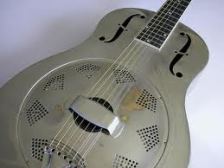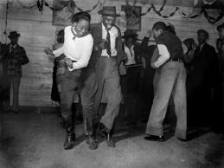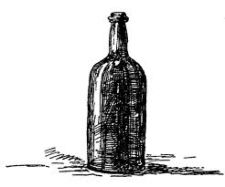Son House – Preachin’ the Blues
The blues has had an uneasy tension with the church. For many God-fearing people in the deep South, blues music was difficult to reconcile with a church-going lifestyle, because of its association with the juke joint and hard liquor drinking, the association that some bluesmen claimed with the devil and the whole idea of “mojo.” Michael Bane, in his book about Elvis, White Boy Singin’ the Blues, says,
“The blues especially were the opposite side of sacred …. You could sing gospel or the blues, but never both. The blues belonged to the Devil, with his high-rollin’ ways… and if you sang his music, the door to the Lord’s house was shut to you.”
That isn’t the whole story, however. The relationship between the church and the blues, was never quite so one-dimensional as Bane makes out. Blues artists went back and forth between careers as preachers and blues performers, and churches hosted blues artists – Blind Willie McTell from Georgia was one who often performed his music in a church setting. So the situation was not straightforward.
Charlie Patton, considered by many to be the “Father of the Delta Blues”, was a notorious womanizer, a hard-drinker and loose-liver. But throughout his life, he would periodically repent, renounce his sins, and take to studying the Bible. Sadly his conversions never lasted too long. An old friend would show up with a guitar and news of a house party and Charlie would bottle up and go.

Whereupon he got himself a guitar, albeit with only 5 strings and a hole in the back and learned to play it, after Willie Wilson (who was the bluesman at the frolic whom he had heard) fixed it up for him. With his guitar tuned in Open G, he soon was “zinging it” as he called it, with the bottleneck slide. Within a matter of weeks, he was out earning money at gigs. And as he said himself, “I kept on playing and got better and better.”
The Allman Brothers with Son House’s Preachin the Blues

“Oh and I had religion Lord this very day
But the womens and the whiskey, well they would not let me pray.”
House developed a taste for alcohol and women that made it just too difficult ultimately to maintain his ministry as a Baptist preacher, although the final break with his faith did not come for a while yet. The road along which House traveled for the rest of his life was never smooth – he was incarcerated in the notorious Parchman Prison Farm for manslaughter, his relationships with women were never straightforward, to say the least, and his drinking descended into alcoholism. His performing career petered out in the early 1940s, although he enjoyed a brief revival towards the end of his life from 1965 in the period’s “folk music revival.”

“Another deacon jumped up and said, ‘Why don’t ya hush?
“You know you drink corn liquor and your lie’s a horrible stink.’”
Sounds very like the accusation that House either had thrown at himself or felt should have been thrown at him. And his disillusionment with religion, or at least his disillusionment with himself as a worthy church leader comes out in these lines from the song:
“Yes, I’m gonna get me religion, I’m gonna join the Baptist Church.
You know I wanna be a Baptist preacher, just so I won’t have to work.”
Perhaps House knew that he himself was guilty of precisely this sort of hypocrisy. House could probably have identified with the words of St. Paul in his letter to the Romans:
“And really, I know of nothing good living in me — in my natural self, that is — for though the will to do what is good is in me, the power to do it is not: the good thing I want to do, I never do; the evil thing which I do not want — that is what I do.” (Rom 7:18,19)

House lived in a different era, one in which the blues and the church were polarized. Now there’s maybe not so much tension between singing the blues and worshipping in a church. Would House’s faith have survived better in more modern times? Hard to know. It might have had a chance.
Son House with Preachin’ the Blues
Jack White with Son House’s Death Letter
(first published at http://downatthecrossroads.wordpress.com)




